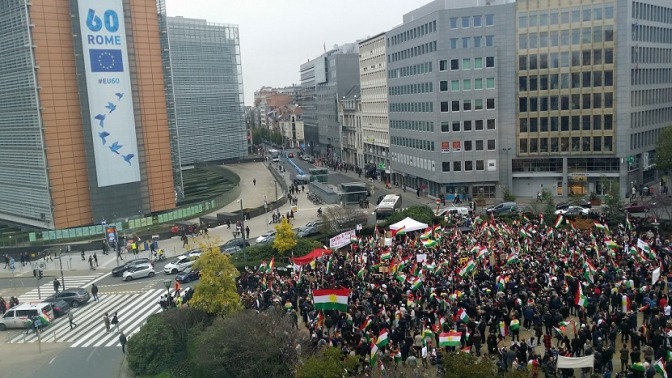Iraqi Kurdistan and Catalonia held referendums on independence one after the other, the first one on 25 September and the second one on 1 October, but without any connection between them. The only similarity is that they are both autonomous regions with their own historical identity and want to establish independent states. While in both referendums more than 90 % voted for independence, only in Kurdistan did a majority of the population turn out to vote.
Since the referendums, the political development in Spain has overshadowed what is happening in Iraq. In the Catalan case the referendum breached the Spanish constitution and Madrid used police force trying to stop it. The referendum resulted in a political crisis, with the central government dissolving the regional government, introducing direct rule, arresting Catalan ministers and issuing warrants for those who managed to escape to Belgium.
In Iraq the referendum did not contradict the constitution but was followed by violence by the central government which launched a military offensive, directly supported by Iran, to retake disputed territories including oil fields which have been under Kurdish control since Peshmerga forces liberated them from the Islamic State. Furthermore, encouraged by its neighbors, Iraq took also control of Kurdistan’s border crossings with Syria, Turkey and Iran.
In both cases EU supported the “territorial integrity” of the countries concerned and declined playing any mediating role, leaving it to Spain, an EU Member State, and Iraq, the creation of European colonial powers, to solve the problems by themselves. While the constitutional crisis in Spain eventually will be solved by peaceful means, possibly already after regional elections scheduled to take place in Catalonia on 21 December, no solution is in sight for Kurdistan.
The Kurdish Regional Government gambled on that Iraq and the international community, although they opposed the referendum, would accept it in view of the decisive role the Peshmerga forces played in defeating the Islamic State and the fact that Kurdistan has received 1.5 – 1.8 million people who fled the terror of the Islamic State. These refugees might otherwise have tried to reach Europe where they are not welcome.
The main arguments of those countries who opposed the referendum, disregarding the Kurdish right to national self-determination, was that it would risk destabilizing the region and undermine the war effort against the Islamic State. In fact, the Islamic State is already defeated, with only small pockets of resistance left. Most of Mosul was recaptured last July and what is left of Raqqa, the capital of the self-declared Caliphate, was taken last October, in both cases with Kurdish troops involved.
The destabilizing argument sounds hollow in a region which has only known wars, sectarian violence and regime changes since the American invasion of Iraq in 2003 and the start of the Arab Spring in 2011 which quickly turned to an Arab winter, especially in Libya, Syria and Yemen. Instead of accepting the Kurdish call for negotiations, Bagdad responded by military means and turned its weapons against its former brothers-in-arms and fellow-citizens.
Only a Kurdish withdrawal from the disputed territories prevented an escalation to a full-fledged civil war. Without negotiations, there is no plan B to resolve the situation. The Kurdish Regional Government has lost most of the oil revenues which financed its budget. The political divide in Iraqi Kurdistan seems bigger than ever with its president having resigned after the referendum he pushed for and violent scenes in its parliament.
What is EU doing to bring the two sides to the negotiating table to de-escalate the situation and reach a mutually acceptable solution? Hardly anything, it seems. As in other conflicts, EU is relying on the American administration, which opposed the referendum, accepted Russian-Iranian meddling in Syria and Iraq, and lacks a strategy.
EU did also oppose the referendum, using the same destabilizing argument which has become a self-fulling prophecy, but at least it seemed to look out for a dialogue and for facilitating a solution.
However, the only action we have seen since the referendum was the launch in mid-October of a so-called civilian common security and defense policy mission in Iraq to assist the Iraqi authorities in the “implementation of the civilian aspects of the Iraqi national security strategy”. The team will consist of up to 35 EU experts with a budget of €14 million. It will focus on institution building and will not lack problems to solve but the Iraqi-Kurdish issue is apparently not on its agenda.
Even the European Parliament, which often is pushing the executive, the European Commission and the European External Action Service (EEAS), into action and a more value-based policy, has kept silent or expressed support for Iraq’s territorial integrity and its artificial borders. These borders were drawn up by Great Britain and France during and after the First World War to serve their colonial interests at that time. Promises of independence to the Kurds were not kept.
The Socialists and Democrats (S&D) political group in the parliament has gone a step further. Following the referendum, its Vice-President Victor Bostinaru issued a statement, echoing EEAS and opposing “actions that could alter existing boundaries and create further instability in the Middle East region.”
It is understandable that S&D warns against unilateral changes to existing borders but what about the Kurdish right to national self-determination? Do the Kurds have less rights than the Palestinians whose right to a state of their own is recognized, and rightly so, by S&D and the international community? As a member of the Arab League, Palestine ignores the legitimate Kurdish aspirations while raising world opinion for its own claims to independence.
The Kurds have been waiting for 100 years for Western promises to be kept and should by now have earned their right to national self-determination. The Kurds in Iraq suffered more than any other ethnic group under the regime of Saddam Hussein and were attacked with chemical weapons. In recent years they have established their own autonomous government in the part of Iraq where they have been living since ancient times.
They also fought bravely in the coalition against the Islamic State when the Iraqi army deserted its positions and are not threatening the rest of Iraq or the region with war and terror.
But this is apparently not enough reason for S&D to support Iraqi-Kurdish independence aspirations. Asked by The Brussels Times about the principle of national self-determination, a spokesperson for S&D claimed that it was not applicable in the Iraqi-Kurdish context. The spokesperson referred to the UN “Declaration on principles of international law concerning friendly relations and cooperation among states” (Resolution 26/25 of 24 October 1970).
According to S&D´s interpretation, the UN resolution concerns mainly “the states resulting from the decolonization process”. I did not find any support for this interpretation in the text. Furthermore, Iraq as a state was established by European colonial powers to serve their oil interests and provide a kingdom for the Hashemite Prince Faisal who had fought against the Ottomans in the First World War and had been expelled from Damascus by the French.
Since then no real decolonization has taken place in Iraq and the Kurdish issue has been left as unfinished business. After 100 years, it is about time to grant the Iraqi Kurds independence or, alternatively, to transform Iraq into a federal state where the different ethnic and national groups will enjoy full autonomy to run their local affairs and share the oil revenues in an equitable and proportional way.
M.Apelblat


